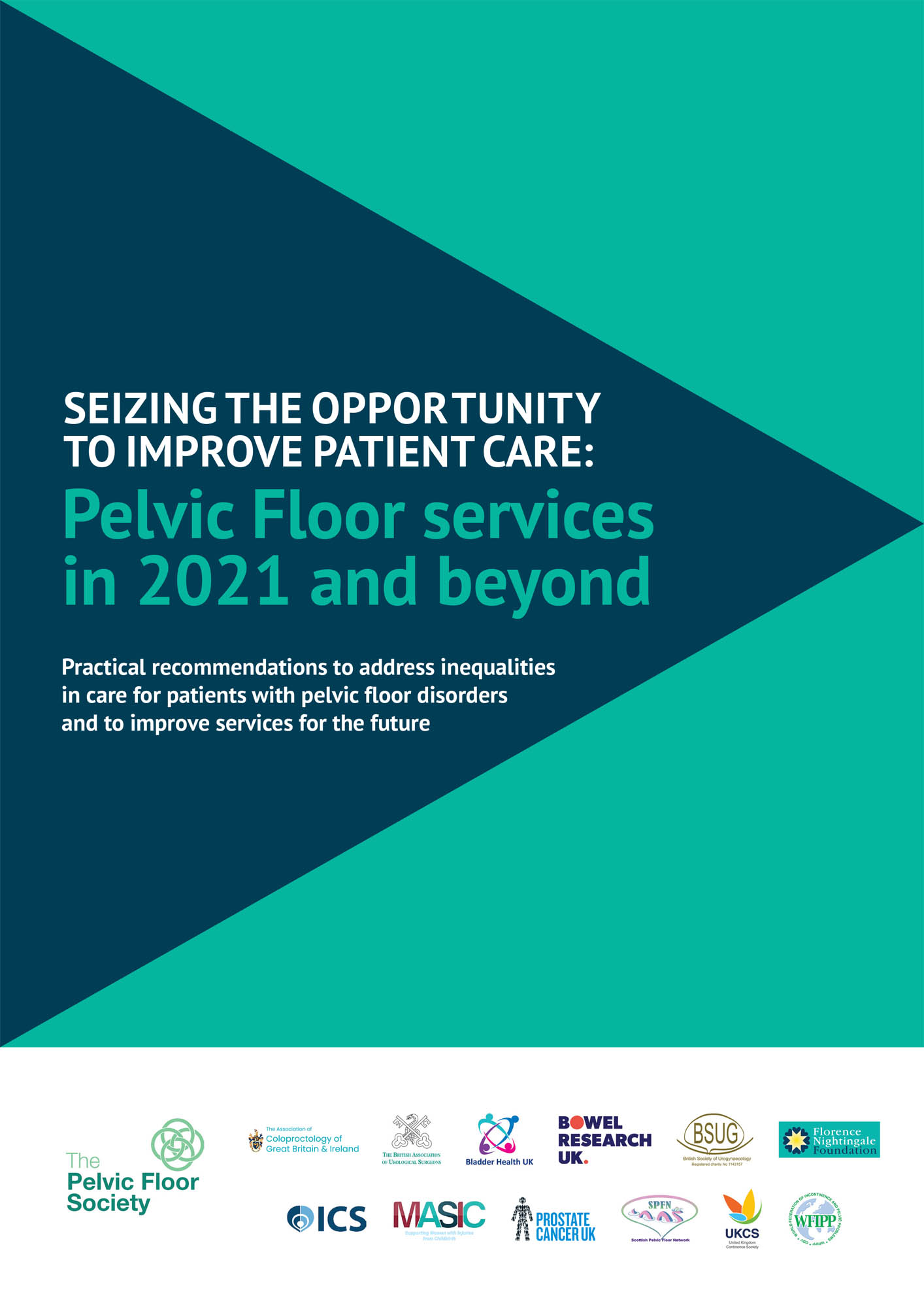

Letter from the report authors
Dear Colleague
We are writing this report at a time of unprecedented strain across the NHS as a result of the COVID-19 pandemic. We recognise that the pressures facing the healthcare system are many and varied and that those patients whose concerns are urgent and life-threatening must be prioritised while elective procedures may take a back-seat, particularly during peaks of infections.
However, the issues we are raising in this document are not newly emergent from an unforeseeable global health crisis. Patients with pelvic floor disorders have been neglected since long before humans first encountered SARS-CoV-2. In fact, the current crisis presents us with an opportunity to effect positive change, which is why we are writing to you now.
Pelvic floor services have long been at the back of the queue for funding and prioritisation. Community continence services across the country are under-funded and under-resourced, with patients facing stark inequalities in care, dependent on the region in which they live. A lack of ‘joined-up’ care of patients with multiple continence issues leads to inefficiencies in the system as well as frustrations for patients. Furthermore, the recent inquiry led by Baroness Cumberlege (Independent Medicines and Medical Devices Safety Review, 2020) has highlighted some of the concerning issues of quality and safety of care being faced by this sector as a consequence of under-funding and neglect (Francis, 2013).
For the most severe cases, surgery can fix these problems – but the wait is long. It can take patients 10 years from first presenting to their GP with symptoms until reaching an accurate diagnosis and receiving the surgery they may need to repair their pelvic floor. And it is not uncommon that further pelvic floor care is required in the time after that. Even before this, it may have taken years for some patients to build up the courage – or become desperate enough – to overcome the taboo and trivialisation of continence disorders in order to consult their GP in the first place.
The impact of this wait and lack of timely treatment on patients is severe. In the UK, around 14 million people are estimated to be living with bladder problems, with 6.5 million adults suffering from some form of bowel issue (NHS England, 2018). That makes millions of people, who, as a result of their condition, have been socially isolating since long before COVID-19 led to a government mandate to do so – prevented from leaving their homes for fear of the consequences of their condition and the embarrassment associated with it. This isolation is associated with a significant impact on mental health and wellbeing, yet they face long delays before receiving the specialist care they need. Pelvic floor disorders and obstetric injuries, while life-changing, are often treatable, and our patients deserve timely access to that treatment as well as proactive promotion of self-help options. Patients need to be made aware that their symptoms can, and should, be improved as early as possible with appropriate care and, even when severe, symptoms may be sufficiently reduced with specialist care.
Further, there are broad economic and societal impacts to be considered. Patients suffering from pelvic floor and continence disorders may be unable to work. Incontinence is often a reason for loved ones, particularly the elderly or those with severe health issues, to be admitted into residential care. In addition to the heart-breaking impact on families, this is one of many additional strains introduced to the health and social care system by delayed treatment. Where treatment is delayed it may also need to be more intensive, bringing with it further resource and financial costs (APPG for Bladder and Bowel Continence Care, 2011).
COVID-19 has magnified these pre-existing inequalities, with waiting lists for routine operations soaring across England (BBC, 2021; COVIDSurg Collaborative, 2020; NHS England and NHS Improvement, 2021). Millions of people are enduring long-lasting suffering from life-changing conditions and/or injuries that can and should be fixed.
The good news is that this situation can be improved. The evolution of sustainability and transformation partnerships (STPs) into integrated care systems (ICS) provides a platform for pelvic floor patients to be better treated, providing an opportunity for health promotion and prevention of bladder and bowel problems, maintenance of quality of life in older years and a focus on addressing health inequalities. With the right support, pelvic floor medicine is perfectly positioned to take advantage of the digital revolution currently taking place across healthcare, which could help to find efficiencies to meet resourcing challenges. By actively changing our models of care, we can help meet these challenges and improve outcomes for patients.
Our report considers these opportunities and proposes practical solutions to the challenges faced by patients and healthcare teams. Owing to the availability of data, many of the points raised are focused on England, but we feel they are equally applicable to the devolved UK nations. We can improve the care and quality of life of this often-overlooked population. But we need to act now.
Yours sincerely,
Charles Knowles
Professor of Surgery, Queen Mary University of London & Hon Cons. Colorectal Surgeon Barts Health NHS Trust
For a full list of the report’s authors click here.
View & Download the Report
REFERENCES
All-Party Parliamentary Group for Bladder and Bowel Continence Care, 2011. Cost-effective Commissioning For Continence Care. Available at: http://www.appgcontinence.org.uk/documents/ (last accessed September 2020).
Baroness Cumberlege, 2020. First Do No Harm: The report of the Independent Medicines and Medical Devices Safety Review. Available at: https://www.immdsreview.org.uk/Report.html (last accessed September 2020).
BBC, 2021. 4.7 million waiting for operations in England. Available at: https://www.bbc.co.uk/news/health-56752599 (last accessed April 2021).
COVIDSurg Collaborative, 2020. Elective surgery cancellations due to the COVID-19 pandemic: global predictive modelling to inform surgical recovery plans. Br J Surg 107:1440–1449.
Francis R, et al., 2013. Report of the Mid-Staffordshire NHS Foundation Trust Public Inquiry. Available at: https://www.gov.uk/government/publications/report-of-the-mid-staffordshire-nhs-foundation-trust-public-inquiry (last accessed March 2021).
NHS England, 2018. Excellence in Continence Care. Available at: https://www.england.nhs.uk/publication/excellence-in-continence-care/ (last accessed September 2020).
NHS England and NHS Improvement, 2021. NHS referral to treatment (RTT) waiting times data. Available at: https://www.england.nhs.uk/statistics/statistical-work-areas/rtt-waiting-times/rtt-data-2020-21/ (last accessed January 2021).
